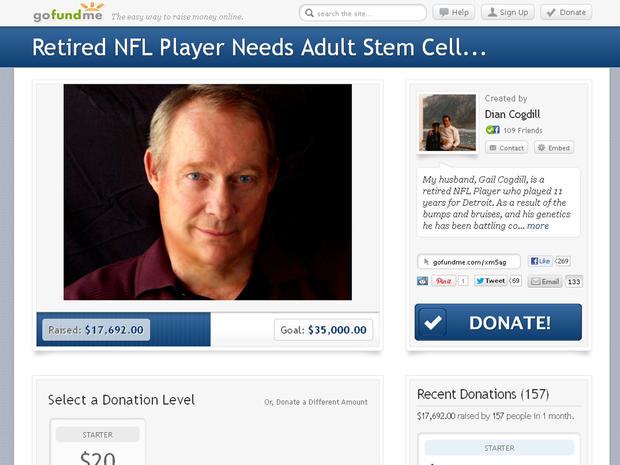Former Detroit Lions great Gail Cogdill turns to crowdfunding for stem cell heart treatment
(CBS News) Ex-Detroit Lions great Gail Cogdill has a failing heart but is too old for a transplant - so he's turning to the Internet for help.
Dick Cheney's heart transplant at 71 spurs age debate
Retired teacher gets New England's first total artificial heart implant
Skin cells transformed into beating heart tissue, fueling heart failure treatment hopes
The 75-year-old who won the 1960 NFL Rookie of the Year for the Lions and became one of the top wide receivers in the franchise's history is raising money online to help pay for an experimental stem cell treatment in the Bahamas, reports Mashable.
His wife Dian has created a page on the crowdfunding site, GoFundMe.com to raise $35,000 for the procedure. She writes as a result of the bumps and bruises and his genetics, Cogdill's heart only operates at 18 percent of its capacity and he's been battling heart failure, but besides his age limitations for transplants, they feel an artificial heart is not a viable option because it would only last for a select number of years and may hinder his quality of life.
The Detroit Free Press reports Codgill had a six-way bypass surgery 10 years ago after a virus attacked his heart. He already has a defibrillator and pacemaker in his chest, and had three stents put in during the spring, according to the paper.
Then the Codgill's heard about procedures in which stem cells are taken from his blood and put back in his heart to strengthen it - a procedure not covered by insurance.
"Gail has a family to live for still, things he has yet to experience, and moments in life that we need him for," Dian writes in her appeal.
Recent research on procedures that harvest stem cells from patients, purify them and allow them to grow, before rein fusing them into the heart have showed promise in patients with heart failure.
Last November, a study of 16 heart failure patients found up to a 38 percent improvement in heart function among patients, with eight patients showing more dramatic improvement. One man even went from not being able to walk 30 feet to playing basketball with his granddaughter and running thirty minutes on his treadmill three days a week, according to the lead researcher.
Mashable reports Cogdill has drained his savings by about $500,000 for his heart problems and knee, ankle, hip and shoulder surgeries as a result of his playing days and that's why he's turning to the Web for financial help.
"People tell me, 'Gail, you knew what the hell you were getting into when you played football,'" Cogdill told Mashable. "No we didn't. We weren't educated, the doctors and trainers weren't educated. We didn't have the knowledge we have now."
Insurance would have covered the $250,000 cost of the artificial heart, according to the Detroit Free Press, but they are on their own for the stem cell procedure.
Brad Damphousse, CEO of GoFundMe told CBSNews.com in an email that the site's "Medical, Illness & Healing" category accounts for 17 percent of all usage across GoFundMe, and in 2012 alone he estimates the site will handle nearly $7 million in donations to that category.
Dr. Arthur Caplan, director of the division of medical ethics at the NYU Langone Medical Center in New York City, told CBSNews.com that there is no ethical or moral issue with someone trying to do what they need to do to raise money for medical care.
"But there are big issues around this," he said
When it comes to online crowdfunding, he said, there is a high chance for fraud or scams. What's more, celebrities or former athletes with greater visibility compete with those who may not get much attention, rendering the playing field uneven, he said.
Damphousse said his site encourages transparency and authenticity from users, and besides screening by a member of the GoFundMe team, users in their community self-police and flag any suspicious activity for review. Additionally the site's payment partners ensure money can only be withdrawn by individuals with confirmed identifies to prevent fraud.
With regards to Cogdill's case, Caplan said the procedure itself is fringe and experimental and while the family may hope it is the solution, there is a chance it may not work.
"If we're going to fix the problem of access to proven treatments, we need to reform the health care system," Caplan said. "I understand why people do [crowdfunding], but it's not a solution."

